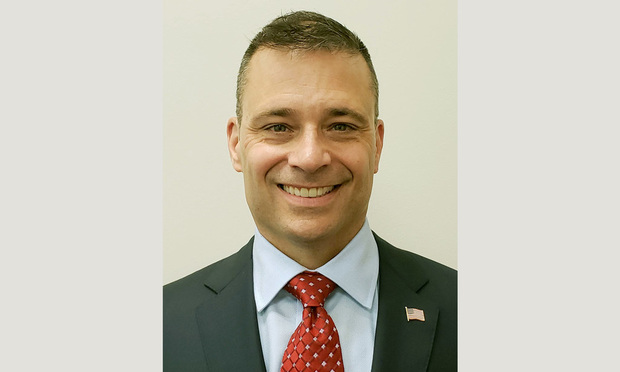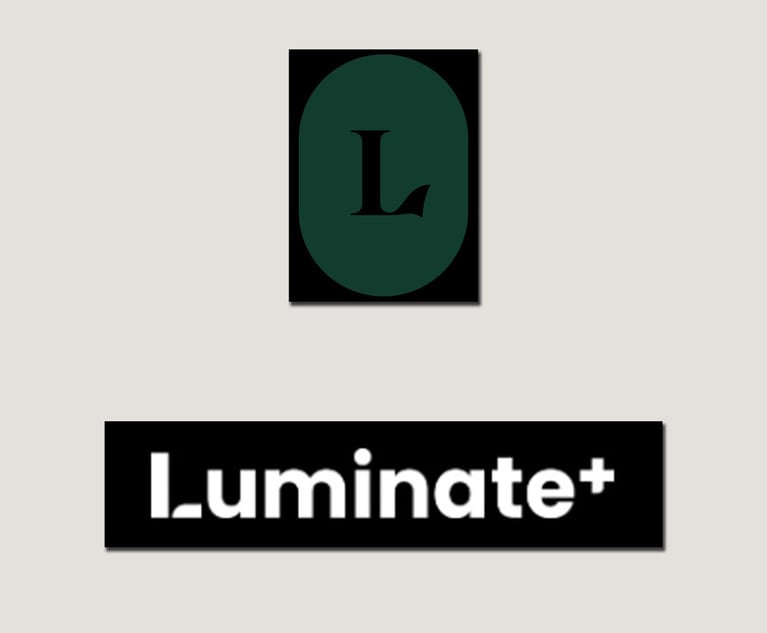CNEX General Counsel Says 'Jury Smelled a Rat' in Huawei Case
Reflecting on the case, CNEX general counsel Matthew Gloss said, “We were incredibly naive for trying to work this out with Futurewei and Huawei.”
July 23, 2019 at 05:18 PM
6 minute read
 Matthew Gloss, general counsel, vice president and corporate secretary of CNEX Labs Inc.
Matthew Gloss, general counsel, vice president and corporate secretary of CNEX Labs Inc.
The chief lawyer for CNEX Labs Inc. was still simmering days after his semiconductor company went toe-to-toe with Huawei Technologies Co. Ltd. in a federal court in Sherman, Texas, over trade-secret theft allegations.
“This is a bad company,” Matthew Gloss said of the Chinese telecom giant. “They love to swim up alongside small companies like mine, raid our IP and when they're done taking it they turn around and sue without mercy, especially in the Eastern District of Texas, where they've clearly weaponized that forum.”
Gloss is the general counsel, vice president and corporate secretary of CNEX, a Silicon Valley-based chipmaker co-founded in 2013 by Yiren “Ronnie” Huang, a former employee of Huawei's U.S. research arm of Futurewei Technologies Inc.
Huawei alleged in a suit it filed in 2017 that Huang built CNEX with technology developed at Futurewei and lured away Huawei's employees. Huawei also accused Huang of violating a provision in his employment contract that required him to notify Huawei of any patents he obtained within a year of his departure from the company.
CNEX alleged in counterclaims that Huawei masqueraded as a potential business partner so it could steal CNEX's trade secrets and have them reverse engineered at Xiamen University in China. CNEX also argued that Huang's patents were exempt from the disclosure provision in his employment agreement because he'd developed the underlying technology before he joined Huawei.
The jury found in late June that Huawei stole trade secrets from CNEX and that Huang violated his employment contract by failing to notify Huawei about the patents. But jurors awarded no damages, concluding that neither side had been harmed or benefited substantially from the conduct in question.
“Huawei did and still does feel very strongly about the underlying facts and the need for Huawei to address the bad acts by multiple employees who went on to form or join CNEX,” said Steven Geiszler, U.S. chief intellectual property litigation counsel for Huawei. He declined to comment further on the case.
'They Were Sure I Was Overreacting'
An attorney for Huawei, Chicago-based Seyfarth Shaw partner Andrew Boutros, said he believed the “jury essentially found for each side.”
“For the most part it was a draw,” he added. “If you look at the wins and losses that were decided by the court and not just the jury, the court only allowed one of the other side's 18 claims to go to the jury [CNEX's counterclaim for misappropriation of trade secrets]. We're happy with how we did under the circumstances, but this was a hard-fought case on each side.”
Gloss considers the verdict to be an obvious victory for CNEX and called the case “seminal,” a pivotal moment in which Huawei, a Chinese firm embroiled in the U.S.-China trade war, was called out in court for having stolen trade secrets from an American company.
He said CNEX's attorneys spoke with jurors after the verdict and were told that the evidence they heard made it clear “there was really only one party that had any technology of interest. And that was CNEX.”
He added, “I think the jury smelled a rat.”
Gloss joined CNEX in 2016, when he said Huang and the other founders were “very, very excited” to be on Huawei's radar. Gloss said the founders' enthusiasm persisted even after Huawei blindsided CNEX with a letter asserting that Huawei owned Huang's patents, laying a foundation for the lawsuit.
“My guys were still excited about having commercial meetings with them. They were sure I was overreacting to the letter and it was all something we could take care of in the course and scope of our commercial negotiations,” he said. “The litigation, unfortunately, proved me right. My CEO has a better appreciation, I think, for the very dark set of facts that we managed.”
Looking back, he said, “We were incredibly naive for trying to work this out with Futurewei and Huawei.”
'It's Still a Chinese Company'
Gloss also asserted that Huawei made a “calculated decision” to set up its headquarters in the Eastern District of Texas, a well-known hotbed of IP litigation, because the company believed it would receive preferential treatment—an allegation that Geiszler and Boutros vehemently denied.
“We had basic motions that were not granted but they [Huawei's] were granted,” Gloss said. “I want to avoid sounding like a guy chewing on sour grapes because the judge wasn't fair. Every general counsel feels that way about a tough case. Everybody deals with this. But I have never seen anything so blatant.”
Boutros, meanwhile, argued it was Huawei that truly faced “difficult circumstances, given the geopolitical climate.”
Dallas-based patent litigator Russ Emerson, a partner at Haynes and Boone who was not involved in the Huawei-CNEX litigation, said he found it hard to believe that Huawei would get preferential treatment in the Eastern District of Texas, or any other U.S. courtroom for that matter.
“Even though they have a presence in East Texas, in Plano, it's still a Chinese company,” he said. “I don't know that an opponent is going to get hometowned by Huawei.”
As the dust settles from the jury verdict, both sides have said they are reviewing their next steps. Gloss said CNEX planned to petition the court for legal fees, which he estimated to be $15 million.
“I believe the right thing is for us to get our legal fees and understand that it can't make use of the courts for such illicit purposes,” he said.
Huawei, meanwhile, has stated that it was “pleased that the jury accepted our evidence finding that Mr. Huang violated his employment agreement with Huawei. Although we disagree, we respect the jury's finding for CNEX on its only surviving counterclaim for which they awarded no damages.”
This content has been archived. It is available through our partners, LexisNexis® and Bloomberg Law.
To view this content, please continue to their sites.
Not a Lexis Subscriber?
Subscribe Now
Not a Bloomberg Law Subscriber?
Subscribe Now
NOT FOR REPRINT
© 2025 ALM Global, LLC, All Rights Reserved. Request academic re-use from www.copyright.com. All other uses, submit a request to [email protected]. For more information visit Asset & Logo Licensing.
You Might Like
View All
Global Software Firm Trying to Jump-Start Growth Hands CLO Post to 3-Time Legal Chief

In-House Legal Network The L Suite Acquires Legal E-Learning Platform Luminate+

Up-and-Comer Scores First Legal Chief Post With Baltimore Orioles, the Team He Cheered for as Kid

Ad Agency Legal Chief Scores $12M Golden Parachute in $13B Sale to Rival
3 minute readTrending Stories
- 1Chief Judge Joins Panel Exploring Causes for Public's Eroding Faith in NY Legal System
- 2Pogo Stick Maker Wants Financing Company to Pay $20M After Bailing Out Client
- 3Goldman Sachs Secures Dismissal of Celebrity Manager's Lawsuit Over Failed Deal
- 4Trump Moves to Withdraw Applications to Halt Now-Completed Sentencing
- 5Trump's RTO Mandate May Have Some Gov't Lawyers Polishing Their Resumes
Who Got The Work
J. Brugh Lower of Gibbons has entered an appearance for industrial equipment supplier Devco Corporation in a pending trademark infringement lawsuit. The suit, accusing the defendant of selling knock-off Graco products, was filed Dec. 18 in New Jersey District Court by Rivkin Radler on behalf of Graco Inc. and Graco Minnesota. The case, assigned to U.S. District Judge Zahid N. Quraishi, is 3:24-cv-11294, Graco Inc. et al v. Devco Corporation.
Who Got The Work
Rebecca Maller-Stein and Kent A. Yalowitz of Arnold & Porter Kaye Scholer have entered their appearances for Hanaco Venture Capital and its executives, Lior Prosor and David Frankel, in a pending securities lawsuit. The action, filed on Dec. 24 in New York Southern District Court by Zell, Aron & Co. on behalf of Goldeneye Advisors, accuses the defendants of negligently and fraudulently managing the plaintiff's $1 million investment. The case, assigned to U.S. District Judge Vernon S. Broderick, is 1:24-cv-09918, Goldeneye Advisors, LLC v. Hanaco Venture Capital, Ltd. et al.
Who Got The Work
Attorneys from A&O Shearman has stepped in as defense counsel for Toronto-Dominion Bank and other defendants in a pending securities class action. The suit, filed Dec. 11 in New York Southern District Court by Bleichmar Fonti & Auld, accuses the defendants of concealing the bank's 'pervasive' deficiencies in regards to its compliance with the Bank Secrecy Act and the quality of its anti-money laundering controls. The case, assigned to U.S. District Judge Arun Subramanian, is 1:24-cv-09445, Gonzalez v. The Toronto-Dominion Bank et al.
Who Got The Work
Crown Castle International, a Pennsylvania company providing shared communications infrastructure, has turned to Luke D. Wolf of Gordon Rees Scully Mansukhani to fend off a pending breach-of-contract lawsuit. The court action, filed Nov. 25 in Michigan Eastern District Court by Hooper Hathaway PC on behalf of The Town Residences LLC, accuses Crown Castle of failing to transfer approximately $30,000 in utility payments from T-Mobile in breach of a roof-top lease and assignment agreement. The case, assigned to U.S. District Judge Susan K. Declercq, is 2:24-cv-13131, The Town Residences LLC v. T-Mobile US, Inc. et al.
Who Got The Work
Wilfred P. Coronato and Daniel M. Schwartz of McCarter & English have stepped in as defense counsel to Electrolux Home Products Inc. in a pending product liability lawsuit. The court action, filed Nov. 26 in New York Eastern District Court by Poulos Lopiccolo PC and Nagel Rice LLP on behalf of David Stern, alleges that the defendant's refrigerators’ drawers and shelving repeatedly break and fall apart within months after purchase. The case, assigned to U.S. District Judge Joan M. Azrack, is 2:24-cv-08204, Stern v. Electrolux Home Products, Inc.
Featured Firms
Law Offices of Gary Martin Hays & Associates, P.C.
(470) 294-1674
Law Offices of Mark E. Salomone
(857) 444-6468
Smith & Hassler
(713) 739-1250






